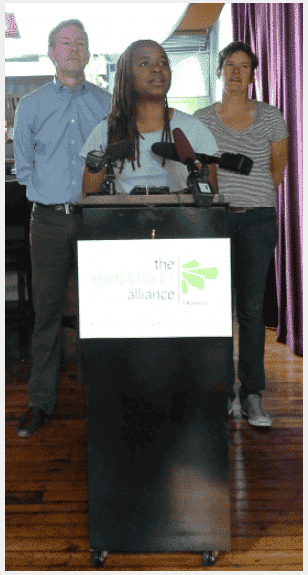Paid Sick Leave, One Year Later: Where’s Our Business-Killing Socialist Hellscape?

Celebrating the one-year anniversary(ish) of Seattle’s Paid Sick Leave ordinance, today members of the The Main Street Alliance of Washington, a coalition representing more than 2,500 small businesses across Washington state, released a report that basically confirms that despite the business-killing socialist Hellscape promised by paid sick leave opponents, business is still booming in King County.

Makini Howell, owner of the vegan restaurant Plum Bistro, pays her workers not to sneeze in your food.
“I’m here to tell you that the sky didn’t fall,” Makini Howell, owner of Plum Bistro, said at a press conference held in her dining area this morning. “Offering paid sick days didn’t have a negative impact on my business… I’ve seen a 25 percent increase in business, hired seven new full time employees, started a food truck, opened a new location, expanded that location, and all without losing an employee.”
“This preliminary look shows that King County has continued to outpace the state in job growth and that Seattle has maintained its share of businesses and taxable retail sales—including the food sector,” announced Marilyn Watkins, policy director of the Economic Opportunity Institute, which helped draft the law. “In short, preliminary data suggests that the economic trends already underway prior to passage of the ordinance continued right along.”
The report (.pdf) seems to indicate that Howell’s experience isn’t an anomaly. While Seattle-specific business data won’t be available until next year, almost half of the county’s accommodation and food service jobs, as well as 37 percent of its retail jobs, are located in Seattle. That said, “There were 7,200 more retail jobs and 3,200 more jobs in food services and drinking places in King County during the first seven months of 2013 than for the same period of 2012,” the report states. Furthermore, “In the first two quarters under the ordinance, 925 more Seattle firms reported sales tax collections than for the same period the previous year, including 142 additional retail firms and 13 additional food service firms.”
Several other restaurant owners also spoke about the negligible financial impacts—and vast positive impacts—of providing paid sick time off for their employees. “We’re continuing to grow,” says Jody Hall, owner of Cupcake Royale, which employs 100 people. “We’re adding another 20 employees in Queen Anne…[The law] helps with retention, it helps with our ability to maintain a great crew of people.”
“We took it one step further, creating a paid time off plan instead of just a paid sick leave plan,” says Joe Fugere, owner of Tutta Bella Neapolitan Pizzeria, who says he added benefits for his employees in Issaquah, as well, and plans on extending the same benefits to Bellevue employees when Tutta Bella opens there in the near future.
Striking back at an unscientific, industry-backed survey released last month that indicated over 50 percent of Seattle restaurant owners had to raise their prices or otherwise mitigate the costs of providing paid sick leave for employees, Howell explained that for her restaurant and other small restaurants, it costs between 40 and 80 dollars a month to cover paid sick time. “You don’t have to bring in a specialist to redo the payroll,” Howell added, “So no, we’re not raising the costs of cupcakes or pizza or tofu to offset that.”
Fugere added that paid sick leave costs “less than one half of one percent of my revenue. There’s no question that the benefits outweigh the costs.” He says 2013 was his best sales year in his businesss’ decade-long history and he hasn’t raised menu prices in two years. “Message to big business and lobbyist: wringing savings out of your employees is really a false profit. My support has only grown stronger because of my experience.”
The paid sick leave law gives people working inside the city limits in companies with more than four employees the right to earn paid leave to use for illness or healthcare needs of themselves or a close family member, during a public health emergency, or for dealing with domestic violence issues, sexual assault, or stalking.